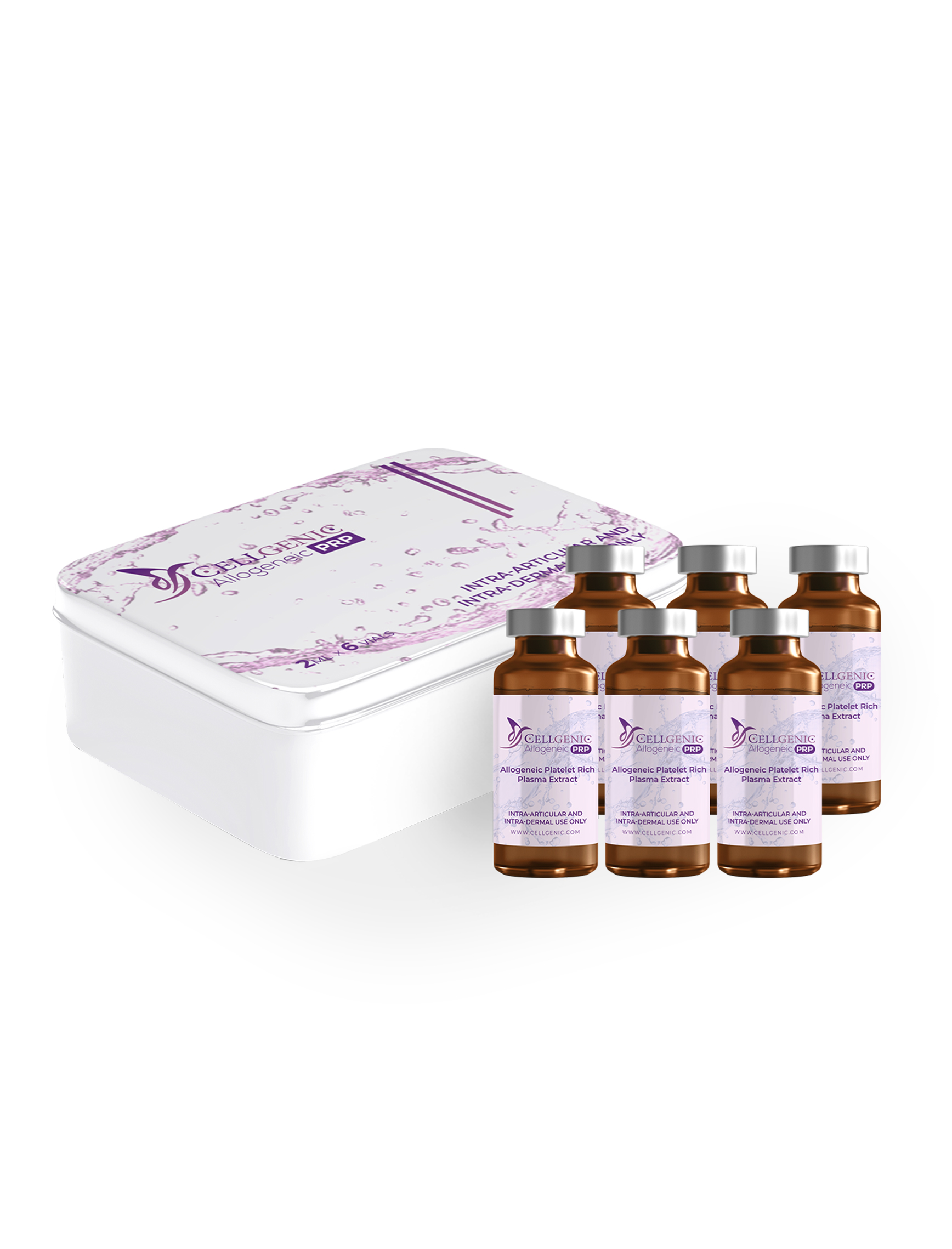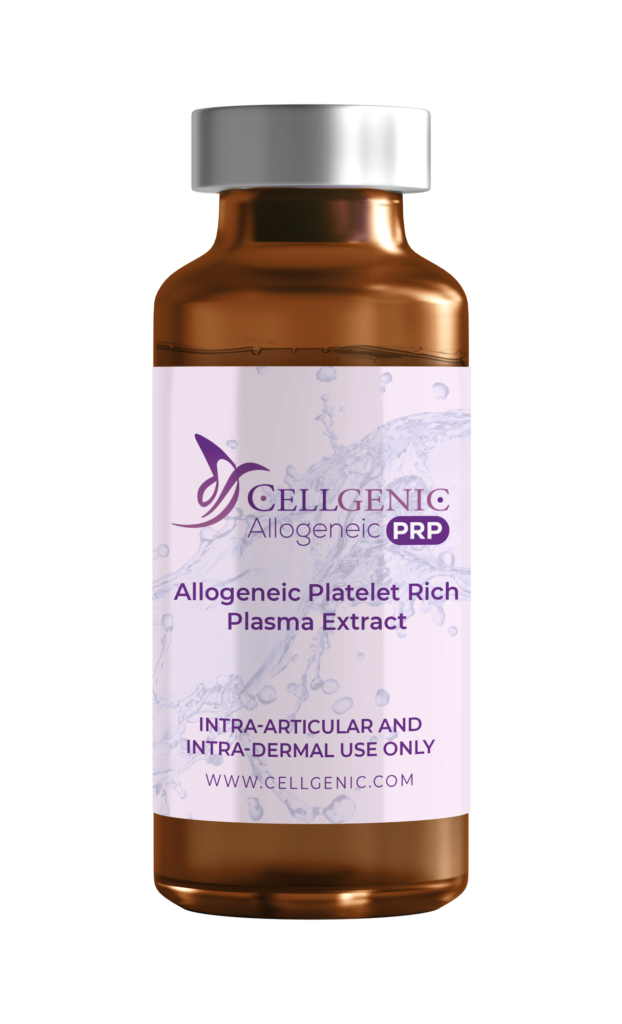Our clinical trials with Cellgenic Lyophilized Exosomes have shown promising results in orthopedic regenerative therapies.
Allogeneic PRP is pre-collected from donors, eliminating the need for patient blood harvesting.

(Box of 6 Allogeneic PRP Vials)
This product is intended for use by medical professionals only. If you are an active licensed physician and wish to place an order please contact our team to create an account before placing an order.
YOUR ORDER WILL NOT BE SHIPPED WITHOUT PRIOR ACCOUNT ACTIVATION AND VERIFICATION.
Allogeneic PRP is pre-collected from donors, eliminating the need for patient blood harvesting.
Offers a higher concentration of growth factors and cytokines for enhanced tissue repair.
Provides consistent platelet concentration and quality, ensuring effective treatment.
Suitable for patients who cannot donate blood, making it accessible for a wider range of clinical situations.

Allogeneic PRP has been shown to be a safe option. Allogeneic PRP offers the benefit of being collected from voluntary blood donors, with its derivatives ready for use without requiring clinicians to collect a sample from the patient. This is particularly useful in clinical situations such as acute burns when patients may be fluid-depleted and thrombocytopenic. However, PRP preparation is contraindicated in patients with haematological disorders, sepsis, or infection, and relative contraindications include the use of non-steroidal anti-inflammatory drugs or corticosteroids, tobacco use, malignancies, and anaemia.
The preparation of PRP involves various protocols that describe the speed, time, temperature of centrifugation, and type of anticoagulant used. These variations affect the yield of bioactive material and make it difficult to compare the efficacy of PRP. The most common PRP preparation method involves taking a whole blood sample through venipuncture into a container coated with citrate anticoagulant. The centrifuge settings impact the concentration of platelets, which remains widely variable in clinical studies, without a clear consensus on an optimal regime for maximizing platelet yield. Different classes of PRP are available, and a multi-disciplinary consensus conference published 4 main families of preparations depending on their leukocyte and fibrin content. An improved classification system has also been suggested to facilitate the comparison of clinical studies and promote further progression in its application in the regenerative medicine field.
While autologous PRP has been widely used and has demonstrated safety and effectiveness in the treatment of various wounds and soft tissue injuries, it has some limitations. One of the primary limitations of autologous PRP is that it requires the harvesting of a patient’s own blood, which is not feasible or safe in all cases. For example, elderly patients, neonates, or individuals unable to donate large quantities of blood may not be able to undergo the procedure. Additionally, the quality and quantity of platelets obtained from a patient’s own blood can vary depending on factors such as age, health status, and medication use.
Allogeneic PRP, on the other hand, is obtained from a donor and can be used as an off-the-shelf therapy for wound repair and musculoskeletal injuries. This eliminates the need for blood harvesting from the patient, making it a more convenient and feasible option for a broader range of patients. Additionally, allogeneic PRP can provide a more standardized and consistent product, as the platelet concentration and quality can be controlled during the manufacturing process.
Furthermore, allogeneic PRP can provide greater amounts of platelet-derived bioactive factors, including growth factors and cytokines, which can promote tissue repair and regeneration. This is because allogeneic PRP is often prepared from a pool of
donors, allowing for a higher concentration of platelets and bioactive factors to be obtained than can be possible with autologous PRP. In addition, allogeneic PRP contains a more diverse array of bioactive factors, as different donors have variations in their platelet composition.
Allogeneic PRP is less costly and time-consuming than autologous PRP, as it eliminates the need for blood harvesting and processing from the patient. This makes the treatment more accessible to patients and healthcare providers.
Our clinical trials with Cellgenic Lyophilized Exosomes have shown promising results in orthopedic regenerative therapies.
Patients report less pain and increased functionality post-treatment, which is a big win in physical therapy.
I’ve been using Cellgenic Lyophilized Exosomes for my athletes suffering from ligament injuries. The recovery process has not only sped up but also strengthened the tissues around the injuries.
After integrating Cellgenic Lyophilized Exosomes into our post-surgical recovery protocols, we’ve observed significantly improved healing times and reduced inflammation in our patients.
Gain insights on the uses, benefits, and guidelines for Cellgenic Lyophilized Exosomes Orthopedics
Cellgenic’s cellular products aim to provide various biological effects, including anti-inflammatory, regenerative, and immunomodulatory properties. These benefits are intended to assist in the recovery and improvement of various medical conditions.
Cellgenic’s products are designed for medical professionals only, including licensed physicians and healthcare institutions. These products must be administered by individuals who are trained and authorized to use cellular therapies.
Packages vary depending on the specific product but generally include the cellular product in a suitable formulation, along with necessary diluents or other components required for the application of the therapy.
These products work by promoting cell-to-cell communication, enhancing cellular functions, and providing necessary growth factors, cytokines, and other bioactive molecules to support tissue repair and regeneration.
Yes, interested buyers must have their account verified and activated by Cellgenic. This process includes confirming the credentials of the healthcare professionals and ensuring compliance with applicable regulations before purchases can be made.